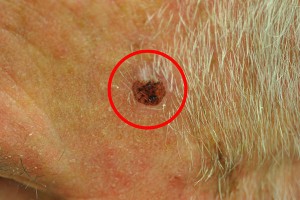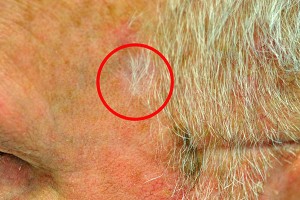Skin Cancer Screening
One in five Americans will develop at least one skin cancer during their lifetime. Chronic sun exposure, history of blistering sunburns, fair complexion, immunosuppression, and family history of skin cancer are factors associated with an increased risk of skin cancer. Early detection and treatment of skin cancer is essential to prevent the spread of disease to other areas of the body, achieve better outcomes, and decrease the emotional burden of the disease. GK Dermatology provides essential South Shore MA skin cancer screening services.

Types of Skin Cancer
Basal cell carcinoma is the most common type of skin cancer, and only exceptionally spreads to other parts of the body. Squamous cell carcinoma may behave more aggressively than basal cell carcinoma, and can metastasize, though rarely does. Melanoma is one of the deadliest forms of skin cancer, and can spread to other parts of the body. It typically presents as a new or changing pigmented lesion, such as a changing mole. There are several forms of melanoma, all with a different prognosis. Generally, the deeper the lesion penetrates into the skin, the worse the prognosis. Most melanomas can be cured if caught early and treated appropriately.
South Shore MA Skin Cancer Screening & Evaluation
Annual skin evaluation by dermatology should be performed in patients with risk factors for skin cancer. Also, patients with history of abnormal moles and/or other atypical lesions, such as actinic keratoses, should be examined routinely. Additionally, performing periodic skin self-examinations can help in the early detection of skin cancer. Specific instructions on how to perform periodic skin self-examinations are provided by your dermatologist. It is recommended that you examine your skin head-to-toe every month in order to pick up any atypical growths. Most patients can tell when one of their moles or growths looks different or is growing in an odd fashion. The ABCDE’s of pigmented lesions (shown on the right) is an easy way to remember the most common features of atypical moles and melanoma.
- A-symmetry: a lesion that shows asymmetric shape.
- B-order irregularity: a lesion that is not perfectly round or oval.
- C-olor: a lesion that presents with a mix of different colors and shades.
- D-iameter: a lesion that is larger than the end of a pencil eraser.
- E-volution: a lesion that is significantly changing over time.
Treatment of Skin Cancer
The treatment of skin cancer must be customized, taking into account the type, size/severity, and location of the cancer, as well as patient’s age. At GK Dermatology, we perform surgical removal through excision, and radiosurgery, and work closely with micrographic (Mohs) surgeons when necessary. We also provide non-surgical interventions for low-risk skin cancers, such as topical creams such as imiquimod, and light therapy (photodynamic therapy).
Before & After: Radiosurgery
At GK Dermatology, we perform South Shore MA skin cancer screening and also participate at the Annual Skin Cancer Screening Programs of the American Academy of Dermatology and the American Society of Dermatologic Surgery.



Squamous cell carcinoma before and after radiosurgery. If you like the results you see here, please call 781-812-1078 to schedule a consultation and learn more